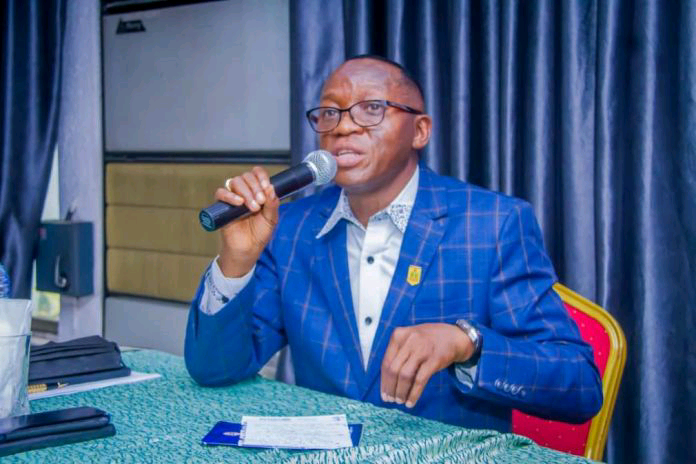
Retired Deputy Inspector General of Police (DIG) Adeleye Oyebade mni has urged the government to draw youths into agriculture to reduce the number of young people involved in drugs and fraud known as Yahoo-Yahoo.

Delivering a lecture organized by the Rotary Club of Ikeja led by the President, Rotarian Adegbenga Badejo, at the Lagos Airport Hotel yesterday, Oyebade who retired into farming as the Chairman/CEO of Rontol Ventures Limited – a conglomerate with interests across agriculture, education, manufacturing, and security services, told the audience that Food Insecurity is part of the security challenges that Nigeria is battling with.
He spoke on the topic ‘Holistic Approach to Security and Peacekeeping in Times of Crisis and Disaster’ and recommended that the Ministry of Interior should adopt a Nigerian decentralized model of Community Policing domesticated for the nation; that all Security agents should apply appropriate STI to strengthen the framework of the domesticated Community Policing concept, and that all Security agencies and other relevant stakeholders (NBA, Council of Traditional Rulers) in Community Policing should collaborate and take appropriate measures to improve the trust and confidence of the public in them.
From Right, President Ikeja Rotary Club, Rotarian Adegbenga Badejo, retired DIG Adeleye Oyebade mni, AIG Sholla David, and Past Assistant Governor -Rotarian Ade Oyenekan
Oyebade said, “The global security environment is characterized by volatility, uncertainty, complexity, and ambiguity with serious consequences for the internal security of nation-states. This has compelled many countries, including Nigeria, to strengthen their internal security framework to make it more responsive to actual or perceived threats.
“In Nigeria, the internal security framework is not responsive enough to contemporary security challenges such as Boko Haram insurgency, farmers-herders conflicts, cultism, kidnapping, banditry, and cattle rustling among others. There have been numerous efforts by successive administrations at addressing the security challenges in the country.
“In 2004, The Nigeria Police Force introduced community policing in seven pilot states as a strategy for involving the communities in addressing security challenges within their domains. However, this strategy of policing was not adequately contextualized, structured, and resourced for effective implementation. This is, largely, because community policing is primarily limited to the Nigeria Police Force and does not incorporate all other internal security stakeholders. Although the National Security Strategy of 2014 further re-enforces the need for community involvement in promoting internal security, this has not been fully implemented.
“The issue of security has taken the center stage of our country. It unavoidably stands as a major challenge to decision-makers, communities, and even groups. The concept of security remains a complex phenomenon that unarguably requires not just countermeasures to deal with but concrete preventive and resilient decisions to manage.
“The terms, crisis, and disaster are often used synonymously. They are clearly related, they are unexpected and unimaginable.”
From Left: AIG Sholla David, Rotarian Adegbenga Badejo, DIG Adeleye Oyebade, Col, Olayinka Jide, and Mr Ralph Abanum
In what the Rotary Club of Ikeja called a knowledge-sharing session, Oyebade presented five approaches centered around prevention, mitigation, preparedness, response, and recovery.
On Domestic Security, Oyebade stressed the importance of security auditing of the environment, as he urged individuals and organizations to do simulation exercises.
“Check fire extinguishers to see if it is outdated. Who is in charge? These are security measures that we need to take,” he said. “In all our thinking, in our private and public environment, we need to be proactive. Our policing concept must also be proactive. What can we do to mitigate it (disaster)? What can we do to prevent it before it happens? We need to be more proactive in our strategy and policy.
“The best way to address a disaster is by being proactive. This means identifying potential hazards and devising safeguards to mitigate their impact. This involves putting permanent measures into place that can minimize risks,” he said.
Speaking further on how to minimize the loss of human lives, Oyebade concluded that proper planning prevents poor performance.
Answering a participant who spoke about state police and asked if governors will not use it to intimidate opponents, Oyebade recommended strengthening of the Institution as he made references to how things work in the United States.
Oyebade insisted that Community Policing is the panacea to Internal Security problems.
As a member of the Senior Executive Course 40 that handled the topic – Strengthening the Internal Security Framework of Nigeria at NIPPS, Oyebade said the set came up with a robust report on proactive steps to be taken, but that report is sitting somewhere now, as well as a paper presented to the government after a tour of countries battling security challenges outside Africa.
He said, “We have the human resources, the training, the institutions, we have done the research that needs to be done; there are volumes of works that have been done behind the scenes on addressing the security problem of this nation.
“Community Policing is the panacea to Internal Security problems, but people don’t understand it. Community Policing has three legs – Community partnership, problem-solving and organizational transformation.
“Why are we here today? Because of the non-implementation of previous works at NIPPS done to strengthen internal security framework and community policing in Nigeria. Models, Policy Options, and strategies are already on paper waiting for full implementation.
“In all of these, the best security in a time of crisis and disaster is preparedness. It is important to be skilled in training on how to respond to various forms of disaster, stay organized which is the best way to ensure readiness.”
He narrated how he handled farmers’ and herders’ clashes as the Commissioner of Police in Oyo State with the support of the late Gov Abiola Ajimobi. He got the parties to sign a communique that ensured peace.
Using Community Policing strategies, Oyebade said he found that some of those boys mending roads on the highways are the ones giving information to kidnappers.
He said that he also practiced Community Policing as the DPO Ipaja and Ilupeju. “We practiced community policing and it worked. We must be able to work out the best kind of policing for a specific environment.
“The area where we are lacking in Nigeria now is to clearly situate this into our environment.
“The policeman who will operate in an environment must know the culture, the language, the topography, and the people. It’s a community partnership… Community Policing is problem-solving.
He expressed regrets that Civics has been removed from the school syllabus in Nigeria, as he spoke about the concept of policing that he saw in Eswatini, where security training starts from secondary school.
Those at the event included the Past Assistant Governor of Rotary, Mr. Ade Oyenekan, Assistant Governor Ralph Abanum, Col. Olayinka Jide, and AIG Sholla David, who also expressed concern over the growing involvement of youths in crimes and anti-social activities.
Describing the present security challenge as something beyond description, AIG David tasked the Rotary Club to target youths and find a way to make them become responsible citizens.
Credit:Newsmakers







